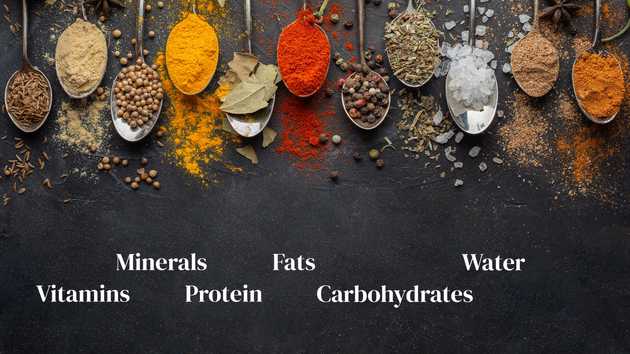
Fasting and longevity
February 22, 2023For most of us living in developed countries, we’re living in a time where we don’t worry about being hungry; the concept of being hungry not by choice is so foreign to us, we take it for granted. Unfortunately (and maybe a little ironically), there are millions of people who do worry each and every day about when their next meal will be.
This blog won’t cover the inequity of this topic or how we can potentially solve this world hunger crisis, but instead, focus on the how being hungry, specifically fasting, affects our health.
So what are the basic nutrients we need to be “healthy”?
Designed by Freepik
There are mainly six essential nutrients we should take daily. These are vitamins, minerals, protein, fats, carbohydrates, and water. The individual amounts can vary depending on gender and body weight, but these core elements are something we’ve heard about for generations from family doctors. Calorie intakes should be around 2,500 for men and 2,000 for women, but in general, we know we take much more than that daily. (As I write this, I’m of course eating my third peanut butter and jelly sandwich)
Let’s face it, we don’t really count calories or think about all these essential nutrients as we prepare our meals or when we buy McDonald’s Happy Meals, but if you want to live a long, healthy life, you should be more mindful about what you eat. Though of course this isn’t easy, and sometimes it can be stressful, but healthy lifestyles are a lot of effort to maintain.
So it’s pretty obvious eating too much and unhealthily is not good for us, but what about not eating enough or at all for awhile? Would it have any negative effects on our body? In the past 10 years, there have been many scientific studies suggesting that fasting can lead to improvements in many health conditions. The average glucose level of healthy body is between 90 to 100 mg/dl and as you fast, your body starts to use this glucose floating around in your bloodstream first as its main energy source. If you have too much of glucose, insulin gets released and stores excess glucose in the form of glycogen.
So the longer you fast, the more quickly and efficiently your body will break down this glycogen that was stored before to produce glucose for energy. Roughly after about 24 hours of fasting, even stored glycogen is depleted and your body begins to utilize energy from fat tissue (this is also how successful diets work too)
Interestingly during this time something else happens in your body other than losing weight. Fasting activates the cellular degradation process called autophagy, which helps slowing down the aging process and has a huge impact on cell renewal. Japanese cell biologist Yoshinori Ohsumi was awarded the Nobel Prize in Physiology or Medicine in 2016 for his discoveries of mechanisms for autophagy. Basically, autophagy is a process to break down old damaged or abnormal cells in our body, which is a critical defense and recycling mechanism to protect our body. Professor Ohsumi discovered that autophagy, a very common result from starvation or stress, can rapidly provide the essential fuel for the amount of energy needed to rebuild the cellular components.
Caloric restriction or fasting is one of the most effective ways to induce autophagy, and scientists believe that it won’t start unless your glucose and insulin levels drop significantly. It might vary depending on your metabolism, but experts believe that it will start around 32 to 48 hours after fasting and peaks around 72 hours. After 72 hours, it maintains that level as long as you are in the fasting state.
Many studies have shown that lack of autophagy may be associated with Crohn’s disease, Diabetes, Heart disease, Huntington’s disease, Kidney disease, Liver disease, and Parkinson’s disease and even cancer.
To me, this suggests that some of these diseases may have derived from the “cellular junk” and damaged cells that haven’t been cleaned properly. If we could utilize this autophagy to clean up our body once in a while we could potentially live much healthier life.
This brings up another question about autophagy whether it can help to slow down the aging process.
First, let’s look at what makes us age.
Throughout our whole life, our body goes through the process of mitosis which is basiclly cell division. This process is carefully controlled by certain genes because it’s a critical to generate a new cell without any error. The only downside of this process is that we are slowly losing information as the cell divides. There is a part of our cells called Telomeres at the end of our chromosomes and the length of a chromosome naturally gets shorter each time cell goes through mitosis. Eventually it becomes too short that it can no longer divide so it dies. This is how aging works biologically speaking and any factors that influence the reduction of our telomere length can lead to premature aging.
So, how does autophagy help with the aging process?
It’s complicated, but there are many journals coming out with proof that autophagy delays the aging process via activation of downstream sirtuin-3 (SIRT3). Sirtuins are signaling proteins involved in metabolic regulation and so far scientists have discovered seven different sirtuins in the human body. Sirtuin can only function in the presence of NAD+ (Nicotinamide) and recent studies discovers these proteins are linked to cellular health and longevity. There was a recent study that proved that in male mice who overproduce sirtuin-6 have an extended lifespan. It was shown that certain polymorphism in Sirt3 gene is found more often people who have lived longer than average expectant rates. There is more evidence coming out about the correlation between Sirtuin and longevity and many in vivo studies backing up sirtuin as a promising target to slow down the aging process.
Can we achieve even more than simply slowing down the aging process when we fast?
According to a paper published in 2020, scientists found that “fasting not only increases the percentage of stem cells with long telomeres but also increases the maximum telomere length in planarian stem cells.” Not only these stem cells will regenerate cells that we need but also will produce more telomerase which is the protein to add DNA to telomeres. Most of our adult somatic tissues silence the telomerase expression except adult stem cells. So this proves that fasting can reduce the rate of telomere shortening and even making it longer.
Reversing the biological clock
Scientists have started to believe that our body actually has the instruction somewhere in our body to rejuvenate and have begun to classify biological aging as a disease and not a natural process. I’m not trying to suggest that people should live forever, but maybe we were meant to live longer than we have been these days.
